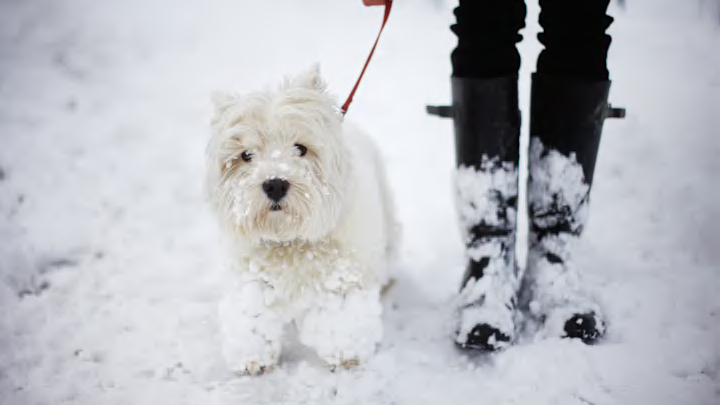Dogs have built-in fur coats, but they still get cold during their winter walks. Even if Fido isn’t hiding whenever you pull out the leash, you should still determine your dog’s tolerance for snowy romps based on factors like size and breed (and not just enthusiasm for eating snow).
- How to Tell If It’s Too Cold to Walk Your Dog Outside
- What to Do When It’s Too Cold to Walk Your Dog Outside
How to Tell If It’s Too Cold to Walk Your Dog Outside
The below handy chart from by Fetch is modeled after a scale developed by Tufts University that determines how canines respond to weather conditions depending on their builds. Before taking your four-legged friend outside, always check the temperature first (including wind chill), then reference the chart to gauge whether your dog can safely withstand the elements.

Small- to medium-sized dogs face cold-weather risks like hypothermia and frostbite when temperatures dip to 40°F. Larger dogs can tough it out for a little longer, but all pet owners should exercise caution and keep walks brief once the thermometer reaches 30°F. Canine accessories like sweaters or booties can safely prolong emergency bathroom strolls. Tiny pet shoes also protect vulnerable paws from sidewalk chemicals like antifreeze, according to NPR.
That said, no two canines—nor their fluff—are exactly alike. Dogs who are conditioned for the cold, or ones with heavy coats, fare better than older dogs or those with health conditions. Tiny, short-haired dogs may struggle too. Shivering is the first sign of hypothermia. As Dr. Kim Smyth, then a staff veterinarian with Petplan (which has since rebranded to Fetch) told WBUR in a 2018 interview, if you see your pups trembling, “you want to get these dogs inside, wrap them up in a warm towel or blanket, and get them to the vet if you need to.”
What to Do When It’s Too Cold to Walk Your Dog Outside
If conditions are too cold and dangerous to safely take your pup for their regular walk, you may have to get creative. You could try taking your dog for a quick walk during the warmest part of the day, and only let them out for very brief, supervised bathroom breaks. If your dog is hesitant to go in the snow, you may have to shovel a small path for them.
Your dog should have plenty of in-house entertainment to keep them physically and mentally stimulated while they’re cooped up inside. Toys and puzzle feeders are great for helping occupy their minds and letting them get some excess energy out. And if the weather is so bad your dog can’t safely step outside for even a brief bathroom break, make sure you’re stocked up on puppy pads so your pets can comfortably pee and poop indoors without making a mess on your floor.
Discover More Stories About Dogs:
A version of this story originally ran in 2018; it has been updated for 2025.
